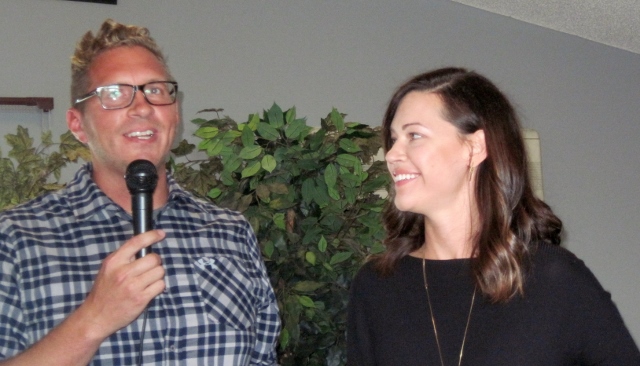An unlikely North Dakota (and Texas) - Mozambique story
Posted by Robert T. Chambers
on Jun 21, 2016
A farmer from southeast North Dakota and an English Literature major from Texas walk into Africa - it sounds like the start of a bad joke but is the real life story of Sarah and Joshua Hardie. It is a modern story of information, technology and commitment that members of the Rotary Club of Wahpeton heard at their regular noon hour meeting on Tuesday, June 21, 2016. The story of their internet romance and subsequent marriage is the prologue to this story and perhaps for another time. The second prologue is the story of Joshua’s registered nurse sister whose story took her to Mozambique where when the family visited her father and brother saw vast unused land. Joshua appends that it is key that the family enjoys and encourages travel. He also notes that the land mass of Mozambique is huge with its length overlaying the distance from San Diego to Seattle.

Joshua and Sarah Hardie
In Mozambique a family farms two and a half acres and gets eighteen bushels of corn per acre to try to sustain themselves. Typically in SE North Dakota a grower will get one hundred and sixty bushels per acre. He saw opportunity when he met a cashew importer-exporter from the Netherlands who had purchased land in the northern part of Mozambique thinking that farming was easy when he knew little about it. He and the Hardies formed a partnership and they began to farm the land. In the local culture farming is not considered a “good” occupation but gradually they are changing that bringing in local people and training them to modern farm techniques. They have also benefited by the disaster in Zimbabwe both by the people in Mozambique not wanting to repeat that experience particularly as they are just now recovering from a terrible civil war in the seventies and eighties after Portugal gave up their colonial control. There have also been many experienced farm people escape the Zimbabwe situation by migrating to Mozambique.
Currently they are farming about one thousand acres using modern yet simple techniques that do not include unsustainable high tech to grow corn and soybean. They have also found a market for their product with a chicken farmer. Their growing season is the opposite of the one here: December through March. In the area there is a problem with the lack of crop storage to prevent famine if there is a bad year something that can easily happen during the rainy season.
Despite being a partner not having farm experience Sarah sought a place to help. Working with the local population she discovered that their two major problems were accessible safe water and education. The two are related as if girls spend their whole day carrying water on their head long distances they have no time for education. Once again she found the local population and government very supportive and was able to drill the first “Garden Well”. Sarah is very aware of all of the world’s problems with bore holes and aquafers as well as lack of buy in by the locals and corruption of government officials when well meaning charities have attempted to help. By being present locally and having local buy in she had been able to mitigate those problems.
Their compelling story that began on the internet is now giving them and their two young children a wonderful adventure all the while farming on two continents with the intent of helping the local Mozambique population to learn modern education and continue the improving economy that they have already started. They are in process of developing a 501c3 entity to help support the work in Mozambique which up to now they have done with their own funds.

